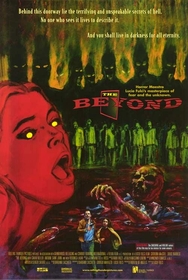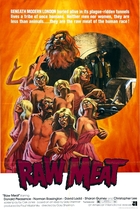Our editor-in-chief Nate Yapp is proud to have contributed to the new book Hidden Horror: A Celebration of 101 Underrated and Overlooked Fright Flicks, edited by Aaron Christensen. Another contributors include Anthony Timpone, B.J. Colangelo, Dave Alexander, Classic-Horror.com's own Robert C. Ring and John W. Bowen. Pick up a copy today from Amazon.com!
The Beyond (1981)
My copy of The Beyond came with a booklet with a handful of short essays related to the film, Fulci, and Italian horror in general. In one of these essays, "The Beyond ... or how Lucio Fulci's Classic Thriller Came Back to Life," Michael Felsher makes the rather self-righteous statement, "The critics don't get it ... they never will ... and that's just fine!" Aside from creating a great oversimplification of critics' views of the film (and a false one at that, considering the critic's review you are about to read), this statement highlights an important quality of The Beyond. It is a mixture of surrealism and straightforward horror, and this mixture naturally makes for a lot of happenings that don't make sense. For this reason, The Beyond can be difficult for people to "get," often feeling like a linear narrative that is thrown together without any sense of "how" or "why," but in reality the events' lack of logic is exactly what makes them horrifying. Combine this purposeful lack of logic with deceptively adept pacing, and you have a true horror masterpiece.
One of Earth's seven gateways to Hell has been breached, causing that realm of despair to begin leaking through. Naturally, that means some out-of-the-ordinary stuff is going to happen. When the main character, a woman named Liza, inherits a broken-down hotel built precisely upon this open gateway and, not realizing the nature of this particular piece of real estate, decides to fix it up and rent out the rooms, inexplicable events begin happening. Liza picks up a blind woman standing in the middle of an empty highway. A hand reaches from the basement wall and kills a plumber. A dead body shows up nailed to the bathroom wall. A man looking up the hotel's building plans in an archive falls off a ladder and is eaten by tarantulas. And finally, the dead begin to rise. None of these events make any sense, and that is precisely what makes them so frightening.
This lack of explanation (because there is no logical explanation to be found) is what turns many viewers off. We never really know why the gateway is opened, though it seems to have something to do with the opening scene, in which a group of vigilantes, years before Liza's story begins, enter the hotel, capture a warlock residing in room 36, chain-whip him, and crucify him against the basement's brick wall. We never find out exactly why the blind woman has to meet Liza, though we do find out where she came from. The reason we are never told exactly why these and a plethora of other events in the film occur is simple: it is the more frightening if we don't understand why horrible things are happening. No matter how bad things get, it is always comforting to be able to identify a reason behind outlandish occurrences. Fulci smartly offers no such luxury.
While the film's horror predominantly lies in the mixture of the logical and the random, there is also plenty of horror to be found in the events themselves. The aforementioned tarantulas-eat-human sequence is so creepy, enhanced greatly by otherworldly sound effects, you will find nothing close to it even in arachnid-based horror films. One character inexplicably ends up beneath a tipped jar of hydrochloric acid, and after we are shown her face melting away, her dissolving body begins spreading across the floor, much to the dismay of her daughter, who is forced to sidestep her mother's foamy, bloody, liquidized remains. Of course, knowing Fulci, there is plenty of graphic eye trauma here, too, as well as zombies whose flesh is so perfectly rotten that, even standing still, they are more horrifying than any others you are likely to find. Fulci takes the gore so far to the extreme, without making it ridiculous, that even standard elements of horror become disturbing.
Despite the story's chaotic nature, upon close inspection, The Beyond is brilliantly paced. The dark and violent nature of the opening warlock sequence gives us an idea of what we're in for and prepares us for the supernatural. Then the immediate plot begins. The first injury occurs when a painter working on the hotel sees a deathly face in the window and falls from the second story. The intensity of things progresses from here until about three-quarters in, at which point the dead become zombies and Liza, along with her friend, Dr. John McCabe, become trapped in a town overrun by the undead. Driving down the street, they pass abandoned houses filled with slow-moving silhouettes. Then, arriving at a hospital, they become surrounded by the things. Their attempt to escape leads to the film's final, masterful scene, in which they find themselves suddenly and utterly engulfed by the barren wasteland that is The Beyond. The pacing perfectly conveys the sense that Hell is spilling more and more into our world.
If there is an aspect of The Beyond that truly doesn't work, even within the parameters of the supernatural overtaking the natural, it is the actions of some of the characters. When Liza takes the plumber, Joe, to the basement, the housekeeper is already down there. When asked what she is doing, she eerily states, "I made this little pathway to the far end ... just for Joe." The plumber responds in an equally strange tone, three-fourths of his face covered in shadow, and, after a moment, gets to work. You would think that this exchange occurred because one or both of the characters is secretly an antagonist. This turns out not to be the case, though, as both characters suffer an early demise. These, as far as the plot goes, were normal, innocent characters, yet Fulci and his writers twist them to perpetuate the film's horror. This type of thing happens more than once. In Fulci's defense, what he was trying to create in The Beyond was not a straightforward movie, but a movie that does whatever it can to instill despair; character consistency is not important to him here. However, what he ended up creating is overall, once we accept the unexplained as unexplained, straightforward. Therefore, when he toys with the characters just to make them act strange, what results are narrative kinks.
It is difficult to determine, upon viewing this film, whether Fulci is aiming to make The Beyond an allegory for the hellishness of everyday life or a simply horrifying experience. For those who are interested, Fulci has explained his intentions with the film, confirming the former of these possibilities: "What I wanted to get across with this film was the idea that all of life is often really a terrible nightmare and that our only refuge is to remain in this world, but outside time."1 Whatever you do, don't approach this movie the way Michael Felsher wants you to. I do believe there are flaws that diminish, minimally, the film's effectiveness, even if they do make for a few unsettling moments. Still, it is much more rewarding to acknowledge the inconsistencies because in the end, ninety percent of the film ends up working exactly as it should. To pass this off as an macabre "exercise," as Felsher does, is to miss out on a plot that will overwhelm you with dread before you even realize it, just like Liza and John.
1 Insert booklet. The Beyond: Limited Edition. DVD. Anchor Bay, 2000.








